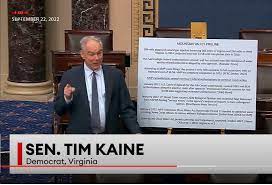From Senator Tim Kaine (D – VA), Senate Office Building, Washington, DC, October 13, 2022
Thank you for contacting me about energy permitting reform and the Mountain Valley Pipeline (MVP). I appreciate hearing from you.
On Tuesday, August 16, 2022, President Biden signed the Inflation Reduction Act into law. This historic legislation invests $369 billion in addressing climate change and improving domestic energy production and manufacturing, reducing carbon emissions by roughly 40 percent by 2030, and bringing an estimated $11.6 billion of investment in large-scale power generation and storage to Virginia. The Inflation Reduction Act does not fund or approve the construction of any pipeline.
As part of a bargain to ensure the passage of the historic Inflation Reduction Act, which I was proud to support as the biggest step the United States has ever taken to address climate change, Senate leadership agreed to take up separate legislation to ensure the completion of the Mountain Valley Pipeline (MVP). If completed as proposed, the MVP would run through Craig, Franklin, Giles, Montgomery, Pittsylvania, and Roanoke counties.
For many years, I have received input from Virginians about the MVP. However, I was not consulted about this deal, and I did not support the pipeline provisions in it pertaining to the Mountain Valley Pipeline. I expressed my views publicly in the run-up to a vote on a critical government funding bill that contained this provision, and I am relieved it was ultimately stripped out due to enough other Senators joining me to oppose it.
We owe it to Virginians to ensure that any energy project that deeply affects their communities, even to the point of seizing their property, should only proceed following an orderly, fair, and transparent process overseen by energy and environmental agencies. That’s why I agree with the need to reform our broken process for permitting energy infrastructure. I am receptive to many of the permitting reform provisions in the Manchin bill, though I believe it could be significantly improved by including my legislation to improve the permitting process, the Pipeline Fairness, Transparency, and Responsible Development Act.
However, the MVP portions of this bill were unacceptable to me. Over 100 miles of this pipeline are in Virginia, but I was not included in the discussions and therefore not given an opportunity to share Virginians’ concerns. In that sense, I stood in the same position as many of my constituents who have felt ignored along the way.
Green-lighting the MVP is contrary to the spirit of permitting reform. Such a deliberate action by Congress to put its thumb on the scale and simply approve this project while shutting down opportunities for full administrative or judicial review is at odds with the bipartisan desire to have a more transparent and workable permitting process. It also contradicts a position I have publicly advocated for many years—that Congress should not be the decider of these projects, but should instead set up an effective administrative permitting system and allow it to work without legislative interference.
I also strongly objected to the highly unusual provisions to eliminate any judicial review for key parts of the MVP process and strip jurisdiction away from the United States Court of Appeals for the Fourth Circuit for cases involving the MVP. The owners of the MVP may be dissatisfied with rulings of the Fourth Circuit; in my 18 years as a civil rights lawyer practicing in the Fourth Circuit, I wasn’t always happy with the Court’s rulings. But a litigant in federal court—rich or poor, individual or company—has appellate remedies if it disagrees with a court ruling. Allowing one party disappointed with the actions of a court to pick a different court, bypass normal administrative processes, and eliminate meaningful judicial review of its project would set a dangerous precedent that could easily lead to abuse and even corruption in the future.
I have tracked the checkered regulatory process of the MVP for many years. I have held public input sessions as far back as 2015. I wrote a 5-page letter to the Federal Energy Regulatory Commission (FERC) summarizing the key points of what I heard. I introduced bipartisan legislation with Senator Mark Warner and Congressman Morgan Griffith to improve the FERC process when it comes to issues like eminent domain, adequate public meetings and opportunities for input, compensation for crossings of the Appalachian Trail or conservation easements, and whether multiple pipelines in the same geographic region should be sited less than 100 miles from one another.
I have been doing everything I can to amplify the voices of Virginians in this process. Whether you oppose or support the pipelines, Virginians deserve to have confidence that FERC has followed a full and fair process and considered all factors. Congress should not make decisions on individual pipelines because that would inevitably lead to partisan decision-making. But Congress writes the laws that govern FERC, and I believe that if the FERC process is flawed, Congress should adjust the law to fix the flaws. This is what I have proposed to do.
I will be sure to keep your views in mind should permitting reform legislation again be considered by the full Senate. Again, thank you for contacting me on this important issue, and please continue to make your voice heard.
Sincerely, Sen. Tim Kaine, U. S. Senate, Washington, DC

